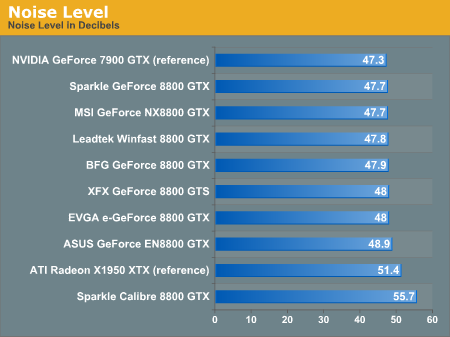GeForce 8800 Roundup: The Best of the Best
by Josh Venning on November 13, 2006 11:04 AM EST- Posted in
- GPUs
Noise
In the era of power and performance per watt, noise is just as important as any other metric. NVIDIA has managed to outfit all of its high end GPUs with relatively quiet coolers and the 8800 series is no different. We tested the noise level of each of these cards while the system was idle, and we also took the ambient noise level of the room (with the system off) for reference. We found that under stress, the cards didn't experience any extra noise from fan speed-ups. For reference, the ambient noise level of the room while testing was 38.1 dB.

The only card that really stood out in these tests was the Sparkle Calibre 8800 GTX. While the peltier element does a great job cooling the GPU, the fans required to cool the peltier make this card much louder than the competition. The Calibre 8800 GTX was about 6 Db louder than any of the other 8800s, with the rest of the cards all getting a fairly consistent noise level of about 48 dB. In fact, the Sparkle Calibre is one of the few cards that can actually surpass ATI X1950 XTX noise levels, a dubious achievement at best.
Final Words
We've looked at the 8800 GTX and GTS and we've seen the kind of performance it's capable of from our 8800 launch article. Today we put each of our 8800 samples through a series of tests and saw what kind of power consumption, heat, and noise levels, as well as what kind of user-overclocks they were capable of. We found the EVGA e-GeForce 8800 GTX and the MSI GeForce NX8800 GTX got the highest overclocks of the group and saw some impressive gains in performance because of this.
The EVGA GeForce 8800 GTX w/ ACS3 seems to do a pretty good job keeping heat down, resulting in the highest overclock of the roundup, and there weren't any problems with excess noise with this card. On the opposite end of the spectrum was the Sparkle Calibre 8800 GTX. Thanks to the card's unique peltier cooler, the Calibre 8800 GTX had extremely high power demands, even for a card as power hungry as the 8800. Although the GPU ran cooler thanks to the peltier element, we couldn't overclock it any further and it managed to be the loudest card in the roundup. Extra noise, heat and power with no tangible benefit is not what we like to see.
Because most of the 8800s we had for this roundup kept the reference designs, we didn't see much difference between them in terms of power, heat and noise (with the exception of the Sparkle Calibre 8800 GTX). Also, as we said earlier, because it's so early on in the 8800's launch, the prices for these cards were generally the same: $650 for the 8800 GTXs and $480 for the GTS cards. We weren't able to find either of the Sparkle cards or the Leadtek Winfast 8800 GTX for sale yet, and the EVGA cards currently available appear to be the standard (i.e. non-ACS3) model, but aside from the Calibre sample, we can expect them to have around the same price tags.
If we had to recommend one of these 8800 cards over the others, the slight nod goes to the EVGA e-GeForce 8800 GTX w/ ACS3; not only did our sample of this card get one of the highest overclocks, but it also ran fairly cool compared to our other 8800 GTXs. If it comes to market for the nearly same price as the others, the decision is simple; on the other hand, a $25-$50 price premium might be too much. If you are among the lucky few able to drop down the money for one of these cards, the EVGA 8800 GTX with ACS3 cooling is the one to go for. If you can't find the EVGA card, then pretty much any of the reference designs will work, and although Sparkle gets extra points for trying something different with its peltier cooler the implementation just didn't work out.










34 Comments
View All Comments
yacoub - Monday, November 13, 2006 - link
I was surprised the eVGA card too the lead since the MSI had a much higher memory clock. I guess these cards are nowhere near being fillrate limited, so the core clock boost is more important? I'm not sure if that's the right conclusion to make.Also lol @ the 1950XTX's heinous noise and heat levels. ;)
The power consumption reduction from its die-shrink (right?) over the 1900XTX is nice though.
Very helpful article. Obvious conclusion: Stay away from the Caliber, lol.
kalrith - Monday, November 13, 2006 - link
On page 5, it says that the Calibre "did get a core boost of 31MHz on the core clock". If the stock speed is 575 and the overclock is 631, shouldn't it be a boost of 56MHz?Also, on page 5 the Calibre's memory overclock is listed as 1021MHz, and on page 6 it's lists as 914MHz.
Josh Venning - Monday, November 13, 2006 - link
Thanks for pointing out the errors on page 5, they've been fixed.Kyteland - Monday, November 13, 2006 - link
On page 2: "First we have the (insert exact card name here) from BFG."